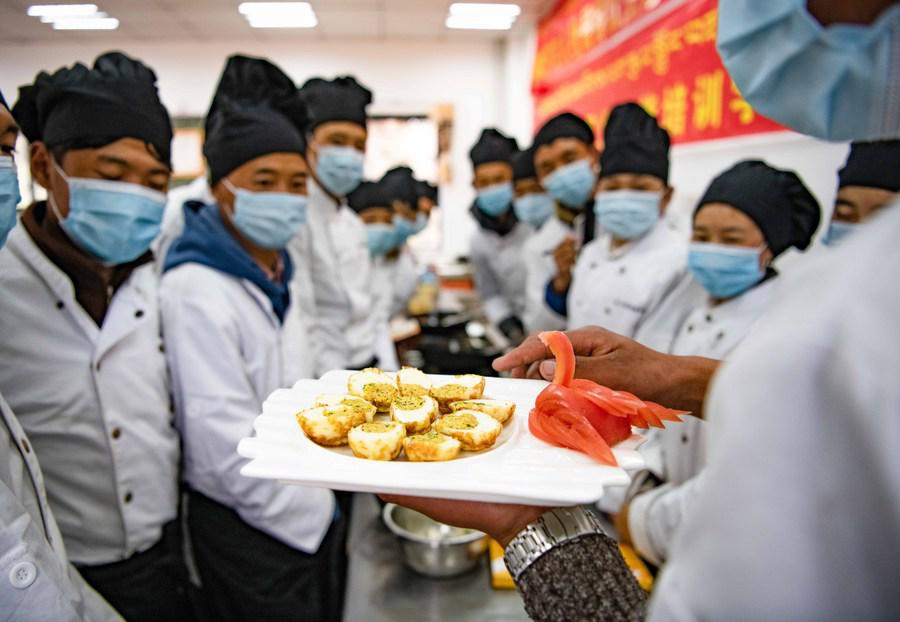

LHASA, Dec. 12 (Xinhua) -- Skillfully using a knife, Tsangten carved a tomato into the shape of a swan with its wings spread wide, as if it were about to take flight.
Tsangten, 21, is the head chef of a restaurant in the city of Nyingchi, southwest China's Tibet Autonomous Region.
Born into a family of herders, the Tibetan turned down the horsewhip of his parents in favor of a cooking knife, after graduating from a vocational school in the regional capital Lhasa.

Locals learn to cook at a vocational school in Nyingchi, southwest China's Tibet Autonomous Region, Nov. 20, 2020. (Xinhua/Purbu Zhaxi)
Through vocational training, young Tibetan farmers and herders, who are no longer tied to the land thanks to modern farming equipment, have chosen to pursue their own interests and secure jobs with higher incomes, thus changing their lives with their own hands.
A DREAM TO PURSUE
A rural native of Qusum County, Tsangten has dreamed of becoming a chef since he was a child.
"The cooking masters in the movies are my idols. With their magic hands, they can bring cucumbers and radishes to life," he said.

Students learn Chinese cooking techniques at a vocational school in Lhasa City, capital of southwest China's Tibet Autonomous Region, Nov. 23, 2020. (Xinhua/Jigme Dorje)
Supported by Yangzom, his mother, Tsangten was enrolled in Lhasa No. 2 Secondary Vocational School in 2015, majoring in cooking.
"I don't want him to repeat our lives herding cattle and toiling in the fields," said Yangzom.
Tsangten soon found that humble vegetables can prove just as unwieldy as a herd of yaks.
In school, Tsangten spent a whole year learning how to cut radish. "My shredded radish was as thick as a finger at first. One year later, it had become hair-thin," he recalled.
He then practiced tossing a 5-kg wok filled with sand before learning to cook from scratch.
Before he graduated, he had become skilled at making dozens of dishes, ranging from traditional Chinese, Western to Tibetan cuisine.
Recommended by his instructor, Tsangten was hired by a renowned restaurant in Nyingchi. He earns some 100,000 yuan (about 15,300 U.S. dollars) a year, twice the income of his entire family from herding and farming.
According to the regional government, Tibet has more than 10 public vocational institutions, with at least one in each prefectural area. Private schools and colleges are also mushrooming in the region to meet the rising demand for vocational training.

Students learn tailoring techniques at a vocational school in Lhasa City, capital of southwest China's Tibet Autonomous Region, Nov. 23, 2020. (Xinhua/Jigme Dorje)
Penpa Drolkar, president of Tibet Vocational Technical College (TVTC) based in Lhasa, said since its establishment 14 years ago, the college has trained more than 20,000 herders and farmers in culinary arts, IT, electrical engineering and garment manufacturing.
"New professions and people with new skills have manifested the progress of Tibet," he said, adding that the college has strived to cultivate more talent to meet the country's target of building a new Tibet through modernization.
With their new skills, many young Tibetans are now dreaming big, envisioning a life for themselves outside the harsh Himalayan region.
Losang Tsering, 23, graduated from the TVTC this year and found a job as a lab technician at a biotechnology company in Nanjing, capital of east China's Jiangsu Province. His monthly salary, currently at 4,800 yuan, will be increased to some 6,000 yuan when the trial period is over.
"I'm looking forward to enjoying a modern life, and I hope to improve my skills in the competitive environment," he said.
NEW MONEY, NEW LIFE
Vocational schools are also organized to train impoverished farmers and herders, equipping them with skills to earn a comfortable living.
Wangnam, a former impoverished villager in rural Nyainrong County, acquired a welding certificate in 2017 after being trained in a vocational school in the city of Nagqu. He opened a welding workshop the following year for the manufacturing of greenhouses and cattle sheds for local farmers, bringing home 36,000 yuan that year.
The workshop was expanded in May this year, with villagers from seven poor households hired.
"It was the skills training that changed my life," said Wangnam, 41.
 Electrician Purbu Dondrup works in Lhunzhub County of Lhasa, capital of southwest China's Tibet Autonomous Region, Nov. 20, 2020. Purbu Dondrup is now working as an electrician after he received free training on electrical skills and got the electrician professional qualification certificate in 2018. (Xinhua/Jigme Dorje)
Electrician Purbu Dondrup works in Lhunzhub County of Lhasa, capital of southwest China's Tibet Autonomous Region, Nov. 20, 2020. Purbu Dondrup is now working as an electrician after he received free training on electrical skills and got the electrician professional qualification certificate in 2018. (Xinhua/Jigme Dorje)
According to the human resources and social security department of the regional government, Tibet has poured 386 million yuan into 724 training projects since 2016, mainly aimed at poverty-stricken counties.
The projects cover fields such as carpentry, agricultural machinery maintenance, welding, sewing, cooking and wool processing. A total of 112,900 residents have benefited from the projects, including 78,500 impoverished people.
In mid-October, Tibet Autonomous Region announced that it had accomplished the historic feat of eradicating absolute poverty, with the average annual net income of poor residents rising from 1,499 yuan in 2015 to 9,328 yuan in 2019.
Qizhala, chairman of the regional government, said vocational education and skill training have been welcomed by farmers and herders, who have seen an increasing proportion of their income come from skilled labor.
"Farmers and herders have embraced vocational training, and it is their chosen path to building a better life," he said.
Every time Tsangten returns home to celebrate the Tibetan new year, he brings home vegetables, meat and seasonings to prepare a banquet for his family. The spicy chicken and fried beef with pepper he cooks are the favorites of his mother Yangzom.
"Children should have their own life. He made the right choice learning to cook," said Yangzom.